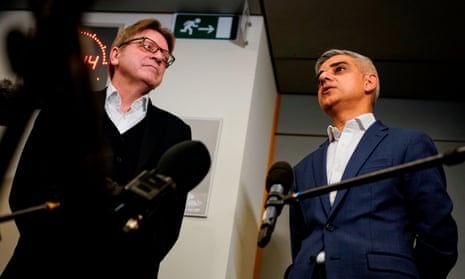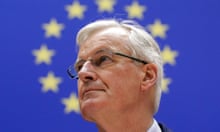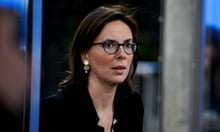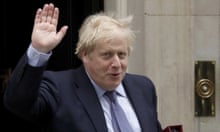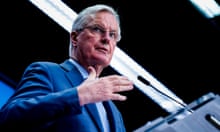The mayor of London, Sadiq Khan, has implored EU negotiators during a visit to Brussels to offer free movement for Britons through “associate citizenship”, as the “next best thing” to membership.
With the backing of the former prime minister of Belgium Guy Verhofstadt, Khan called for the idea to be at the “the heart” of the negotiations over the future relationship.
Khan said that rejoining the EU was not foreseeable in the “short to medium term” but that associate citizenship of the bloc could be one way to “make the best of Brexit”.
The idea had been first raised in late 2016 by Verhofstadt, who was then the European parliament’s Brexit coordinator.
The offer would include continued freedom of movement and residence around the bloc for those who wished to retain such rights. Such a status would also protect rights in healthcare, welfare and workplace conditions and likely the right to vote in European parliament elections.
Khan told reporters that he believed the idea had merit. “There’s an opportunity for us to move forward with this and I’ve been pleased with the response and it gives hope to London, as well as across our country”, he said, following meetings with EU officials.
The chances of such an initiative making headway in the negotiations are extremely limited as it would be unlawful under EU legislation.
There is unlikely to be appetite for any rewriting of treaties among the 27 member states, given the UK government’s hostile attitude to the free movement of EU nationals who wish to live and work in Britain.
TimelineFrom Brefusal to Brexit: a history of Britain in the EU
Show
After 47 years and 30 days it was all over. As the clock struck 11pm on 31 January 2020, the UK was officially divorced from the EU and began trying to carve out a new global role as a sovereign nation. It was a union that got off to a tricky start and continued to be marked by the UK’s sometimes conflicted relationship with its neighbours.
The French president, Charles de Gaulle, vetoes Britain’s entry to EEC, accusing the UK of a “deep-seated hostility” towards the European project.
With Sir Edward Heath having signed the accession treaty the previous year, the UK enters the EEC in an official ceremony complete with a torch-lit rally, dickie-bowed officials and a procession of political leaders, including former prime ministers Harold Macmillan and Alec Douglas-Home.
The UK decides to stay in the common market after 67% voted "yes". Margaret Thatcher, later to be leader of the Conservative party, campaigned to remain.
Margaret Thatcher negotiated what became known as the UK rebate with other EU members after the "iron lady" marched into the former French royal palace at Fontainebleau to demand “our own money back” claiming for every £2 contributed we get only £1 back” despite being one of the “three poorer” members of the community.
It was a move that sowed the seeds of Tory Euroscepticism that was to later cause the Brexit schism in the party.
Thatcher served notice on the EU community in a defining moment in EU politics in which she questioned the expansionist plans of Jacques Delors, who had remarked that 80% of all decisions on economic and social policy would be made by the European Community within 10 years with a European government in “embryo”. That was a bridge too far for Thatcher.
Collapse of Berlin wall and fall of communism in eastern Europe, which would later lead to expansion of EU.
Divisions between the UK and the EU deepened with Thatcher telling the Commons in an infamous speech it was ‘no, no, no’ to what she saw as Delors’ continued power grab. Rupert Murdoch’s Sun newspaper ratchets up its opposition to Europe with a two-fingered “Up yours Delors” front page.
A collapse in the pound forced prime minister John Major and the then chancellor Norman Lamont to pull the UK out of the Exchange Rate Mechanism.
On 1 January, customs checks and duties were removed across the bloc. Thatcher hailed the vision of “a single market without barriers – visible or invisible – giving you direct and unhindered access to the purchasing power of over 300 million of the world’s wealthiest and most prosperous people".
Tory rebels vote against the treaty that paved the way for the creation of the European Union. John Major won the vote the following day in a pyrrhic victory.
Tony Blair patches up the relationship. Signs up to social charter and workers' rights.
Nigel Farage elected an MEP and immediately goes on the offensive in Brussels. “Our interests are best served by not being a member of this club,” he said in his maiden speech. “The level playing field is about as level as the decks of the Titanic after it hit an iceberg.”
Chancellor Gordon Brown decides the UK will not join the euro.
EU enlarges to to include eight countries of the former eastern bloc including Poland, Hungary and the Czech Republic.
EU expands again, allowing Romania and Bulgaria into the club.
Anti-immigration hysteria seems to take hold with references to “cockroches” by Katie Hopkins in the Sun and tabloid headlines such as “How many more can we take?” and “Calais crisis: send in the dogs”.
David Cameron returns from Brussels with an EU reform package - but it isn't enough to appease the Eurosceptic wing of his own party
The UK votes to leave the European Union, triggering David Cameron's resignation and paving the way for Theresa May to become prime minister
After years of parliamentary impasse during Theresa May's attempt to get a deal agreed, the UK leaves the EU.
Speaking at a joint press conference with Khan, Verhofstadt conceded that the biggest battle would be in persuading the member states to engage with the issue.
“Why not also give such a citizenship and, and the rights linked to the [EU] constitution, to people who want to keep that linked with with you?”, he asked. “That will certainly return in the coming months because such an idea needs to be discussed around the negotiation table”.
Verhofstadt said that the UK would need to reciprocate. “My idea would be a proposal from the European side that is hopefully well received by by the UK side”, he said. “But first of all, let’s be very frank about it, we need to do a lot of work here in Europe to convince member states about that… Also from the UK side they should offer them the same possibilities and the same rights to EU citizens.”
